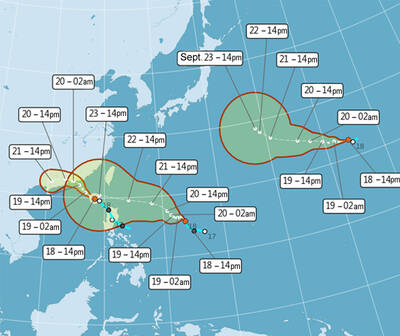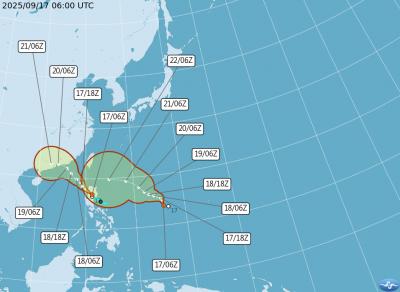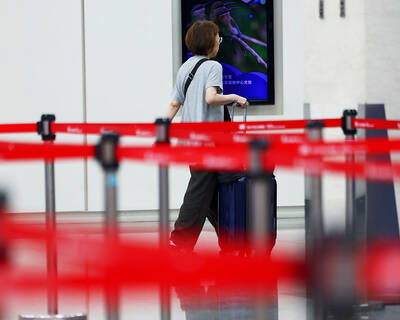Animal rights advocates yesterday called on the government to take steps toward ensuring more humane treatment for pigs.
Environment and Animal Society of Taiwan director Chen Yu-min (陳玉敏) said that since 1981 more than NT$2 billion (US$65 million) has been spent on the implementation of quality certification marks for pork products, but swine are still treated inhumanely before, during and after slaughter.
The government has established various certification systems, such as Certified Agricultural Standards (CAS) and Good Manufacturing Practice (GMP), that ensure the quality of pork and assure consumers of acceptable slaughter practices, Chen told a press conference, however, most pigs were still conscious when they were slaughtered, breaching the government’s guidelines that pigs be electrically stunned prior to their death.
“The pigs are hung upside down while fully conscious and then have their throats slit,” Chen said, adding that in addition to inhumane slaughter practices, the pigs also suffer several other torturous procedures.
Pigs are still sold at live auctions, where they are whipped and corralled, she said, adding that none of the certifications require humane treatment of pigs during transport, herding, unloading, tethering or stunning.
“Even traditional open-air farmers’ markets have CAS-approved pork,” she said. “This is impossible because CAS stipulates that the pork must be properly refrigerated. At these stands, the pork is not refrigerated and usually delivered before the vendors arrive, leading to contamination by rats and unsanitary conditions.”
The transportation of the pork also lacks the required refrigeration for CAS approval, she said.

PEAK MONTHS: Data showed that on average 25 to 27 typhoons formed in the Pacific and South China seas annually, with about four forming per month in July and October One of three tropical depressions in the Pacific strengthened into a typhoon yesterday afternoon, while two others are expected to become typhoons by today, Central Weather Administration (CWA) forecaster Lee Ming-hsiang (李名翔) said yesterday. The outer circulation of Tropical Depression No. 20, now Typhoon Mitag, has brought light rain to Hualien, Taitung and areas in the south, Lee said, adding that as of 2pm yesterday, Mitag was moving west-northwest at 16kph, but is not expected to directly affect Taiwan. It was possible that Tropical Depression No. 21 would become a typhoon as soon as last night, he said. It was moving in a

A Taiwanese academic yesterday said that Chinese Ambassador to Denmark Wang Xuefeng (王雪峰) disrespected Denmark and Japan when he earlier this year allegedly asked Japan’s embassy to make Taiwan’s representatives leave an event in Copenhagen. The Danish-language Berlingske on Sunday reported the incident in an article with the headline “The emperor’s birthday ended in drama in Copenhagen: More conflict may be on the way between Denmark and China.” It said that on Feb. 26, the Japanese embassy in Denmark held an event for Japanese Emperor Naruhito’s birthday, with about 200 guests in attendance, including representatives from Taiwan. After addressing the Japanese hosts, Wang

One of two tropical depressions that formed offshore this morning could turn into a moderate typhoon by the weekend, the Central Weather Administration (CWA) said today. Tropical Depression No. 21 formed at 8am about 1,850km off the southeast coast, CWA forecaster Lee Meng-hsuan (李孟軒) said. It is expected to move in a northwesterly direction as it continues building momentum, possibly intensifying into Typhoon Mitag this weekend, she added. The radius of the storm is expected to reach almost 200km, she said. It is expected to approach southeast of Taiwan on Monday and pass through the Bashi Channel between Tuesday and Wednesday,

About nine Taiwanese are “disappeared,” detained, or otherwise deprived of freedom of movement in China each month, the Mainland Affairs Council (MAC) said yesterday. Between Jan. 1 last year and Aug. 31 this year, 188 Taiwanese travelers went missing, were detained and interrogated, or had their personal freedom restricted, with some questioned in airports or hotel lobbies, the council said. In a statement ahead of the Mid-Autumn Festival, the council urged people visiting China for any reason to be highly vigilant and aware of the risks. Of the reported cases, 50 people were “disappeared” after entering China, 19 were detained and 119 had